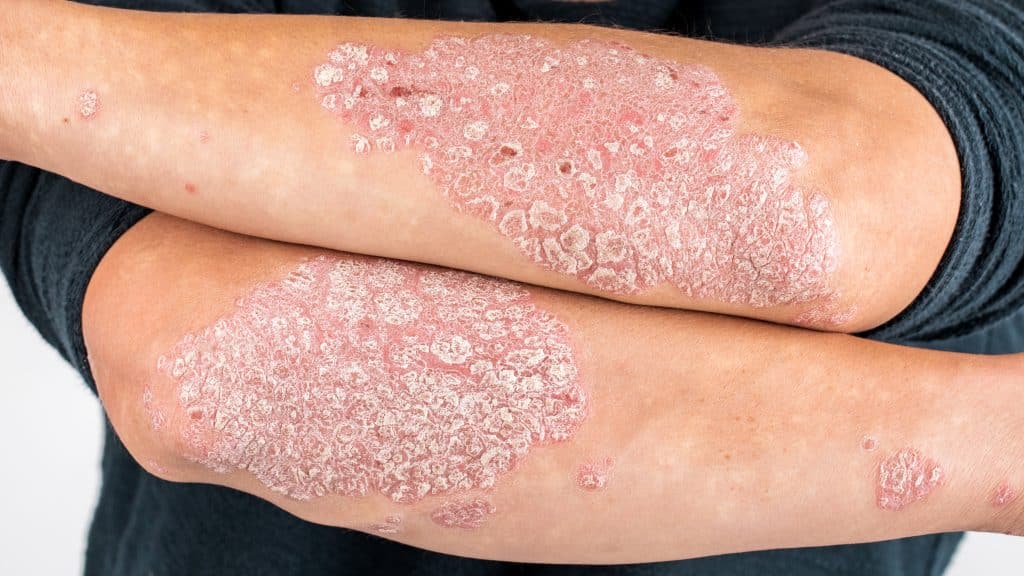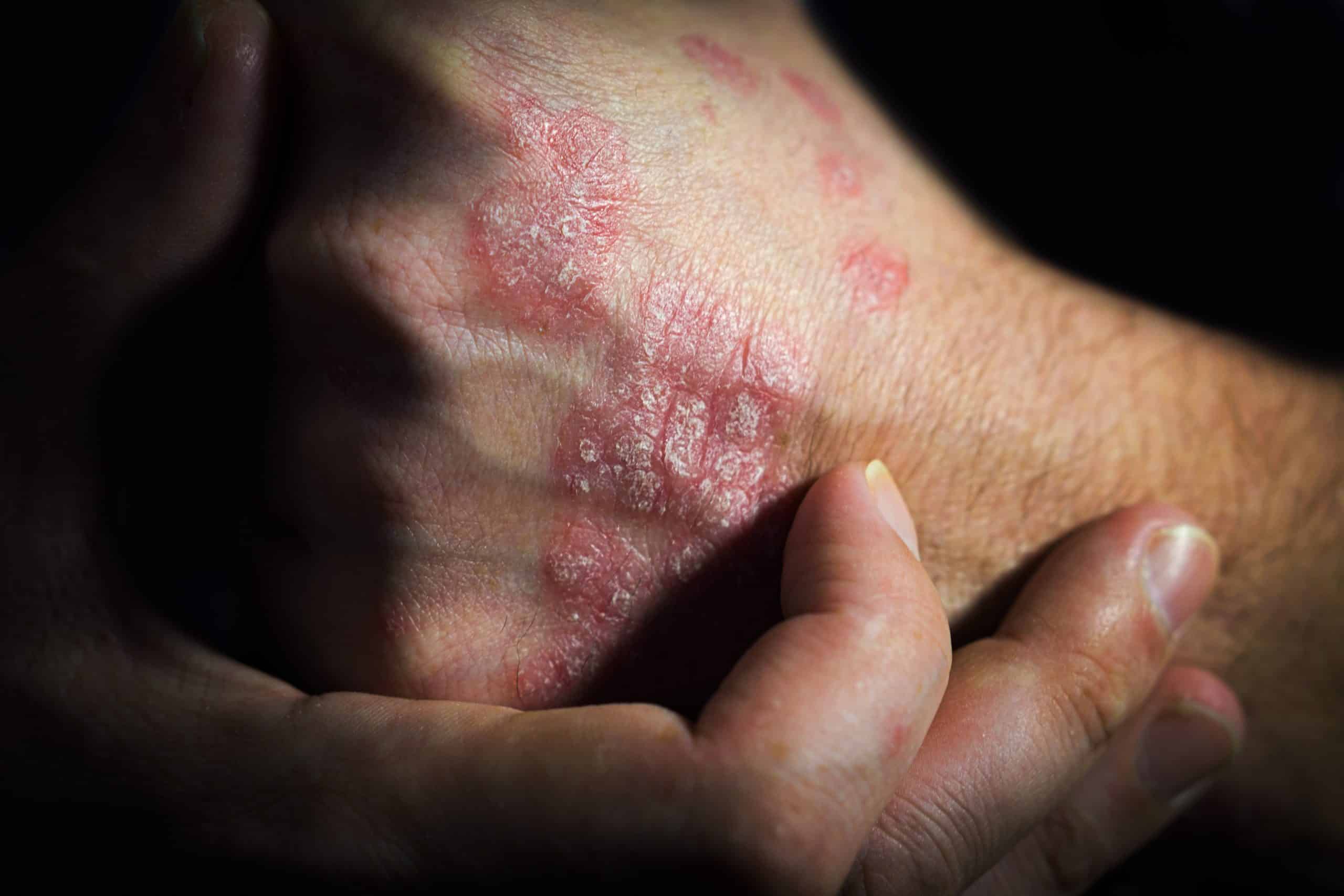What Causes Psoriasis – And What Can Be Done About It
As with other autoimmune conditions, exactly what causes psoriasis hasn’t been identified by the medical establishment. Psoriasis is an autoimmune disorder that leads to an increase in the production of skin cells which causes patches of inflamed, red, and scaly skin. Certain triggers can cause flare-ups, such as stress, certain medications, and even skin injuries.
Risk Factors For Developing Psoriasis
Psoriasis affects about 2% of the United States population. While it can occur at any age, it is more common in adults. Several factors can increase the risk of developing psoriasis. People who have family members with psoriasis have an increased risk of developing it.1
Certain infections, such as strep throat, can trigger psoriasis. Stress can cause psoriasis to manifest in susceptible individuals. Smoking can increase the risk of developing and worsening psoriasis. Some medications, including lithium, beta-blockers, and antimalarial medications, can make psoriasis worse. Hormone-related issues can affect the immune system, which may increase the risk of developing psoriasis.
Trauma or injury to the skin, such as a cut or scrape, can trigger the development of psoriasis in some people. Exposure to cold temperatures and dry climates may increase the risk of developing psoriasis. People who experience sunburns are more likely to develop psoriasis. People who are obese or overweight have an increased risk of developing psoriasis. Drinking excessive amounts of alcohol can increase the risk of developing and worsening psoriasis.2
The Root Of Autoimmune Conditions Like Psoriasis
Chronic inflammation is the root of many autoimmune conditions. Chronic inflammation is an ongoing, low-level inflammatory response that can damage the body’s tissues over time and lead to progressive health decline. This type of inflammation can be caused by a variety of factors, including infections, toxins, allergens, or stress. Inflammation can also be triggered by an imbalance of gut bacteria or a poor diet.
When chronic inflammation is left unchecked, it can lead to the development of autoimmune conditions such as rheumatoid arthritis, psoriasis, and lupus. In these cases, the body’s immune system mistakenly attacks its own healthy cells and tissue because it perceives them as foreign invaders.3
If we wish to treat psoriasis, we must remove the factors that are causing chronic inflammation.
Read more about how to stop inflammation.
What Causes Psoriasis – Genetics
The GRHL3 gene is involved in the development of psoriasis. This gene is located on chromosome 17 and codes for a protein with roles in skin cell differentiation and apoptosis, as well as other functions. Mutations in this gene have been linked to both severe and mild forms of psoriasis. Additionally, GRHL3 expression is increased in psoriatic lesions, defining the genetic role in the pathogenesis of the disease.4

Psoriasis And Stress
Stress plays an important role in the development and exacerbation of psoriasis symptoms due to its ability to trigger a hormonal response that activates the immune system. This is why it’s important to learn how to recognize and manage stress in order to reduce the likelihood of psoriasis flare-ups.5
To deal with stress head-on, we need to pinpoint its cause. Taking small steps towards alleviating stress can make a big difference in reducing overall levels of anxiety. This might mean taking a break from work, exercising regularly, spending time with family and friends, or seeking professional help if necessary.
What Causes Psoriasis – Heavy Metals
Underlying factors like heavy metal toxicity can be directly responsible for an overwhelming stress response. Exposure to heavy metals can result in a range of health problems, including neurological disorders, and organ damage. The presence of these metals in the body also increases stress load, as they interfere with our normal metabolic functions. Chronic exposure to high levels of heavy metals can lead to an increased risk of mental health issues such as depression, anxiety, and fatigue.6
Furthermore, heavy metal toxicity is responsible for chronic inflammation and is therefore linked to most autoimmune conditions.
Read more about toxic heavy metals.
Psoriasis – The Connection Between The Nervous System And The Immune System
Recent research has shown a connection between the nervous system and the immune system by way of the gut microbiota in those with psoriasis. Studies have also found that inflammation of the skin can be triggered by psychological stress or physical trauma, indicating a link between the two systems.
The nervous system is responsible for sending signals to the immune system in response to stress or other outside stimuli. The immune system then responds by releasing proteins called cytokines, which can lead to inflammation and an increased risk of psoriasis flare-ups.7
Stress can play a major role in triggering psoriasis flare-ups and worsening existing symptoms. Those with psoriasis may benefit from stress reduction techniques such as yoga, meditation, or mindfulness, which can help to reduce inflammation and improve overall skin health.

What Causes Psoriasis – Hormonal Imbalances
Hormonal imbalances can play a role in the development and exacerbation of psoriasis. Fluctuations in hormones, such as those that occur during puberty or menopause, may trigger psoriasis flare-ups.8 Additionally, certain medical conditions, such as thyroid disease, metabolic syndrome, and other forms of hormone dysregulation may lead to a greater likelihood of developing psoriasis.9
Read more about thyroid dysfunction.
What Causes Psoriasis – Air Pollution
The link between air pollution and psoriasis has been studied for some time now. Studies have shown that exposure to air pollutants can increase the chances of developing psoriasis, particularly in those who suffer from atopic dermatitis or allergies. In particular, studies have suggested that exposure to ozone, carbon monoxide, sulfur dioxide, and nitrous oxide may increase the risk of psoriasis.10
What Causes Psoriasis – Cigarettes And Alcohol
Smoking cigarettes and drinking alcohol can both be detrimental to a person’s health, especially for those living with psoriasis. Studies have shown that there is a strong correlation between smoking and an increased risk of developing psoriasis, as well as experiencing more severe flare-ups. Additionally, even light to moderate alcohol consumption has been linked to an increased risk of psoriasis.11
Effective Psoriasis Treatments – Climatotherapy
Climatotherapy is a type of psoriasis treatment that involves exposing patients to certain climates or weather conditions. This exposure can be done in different ways, such as taking a vacation to a climate that is beneficial for psoriasis, using home-based treatment, or having a stay at an inpatient treatment center for psoriasis.
Dead Sea climatotherapy (DSC) is a therapeutic approach that has been used for centuries to treat various skin conditions such as atopic dermatitis, psoriasis, vitiligo, and alopecia areata. It consists of sun exposure and Dead Sea bathing, which has been found to be very effective in improving psoriasis.12
The combination of exposure to the sun’s ultraviolet radiation, combined with the high salt content and mineral content of the Dead Sea, works to reduce inflammation, accelerate healing, and improve skin health overall. Additionally, DSC has psychological benefits such as stress reduction and improved mood.13

Effective Psoriasis Treatments – Phototherapy
Phototherapy is another type of psoriasis treatment that uses ultraviolet light from either natural or artificial sources to treat skin lesions caused by psoriasis. Phototherapy helps reduce inflammation, itching, and scaling of the skin without the use of medications. It can be done in either a medical office or at home with specialized equipment.14
Effective Psoriasis Treatments – Vitamin D
Vitamin D cream is a topical treatment that can help relieve the symptoms of psoriasis. Vitamin D cream works by slowing down skin cell growth, reducing inflammation, and regulating the immune system. It can also help to reduce itching and scaling.
Oral vitamin D consumption, ideally in the form of vitamin D-rich food, is a popular treatment option for psoriasis and other autoimmune conditions due to its ability to help regulate the immune system. Vitamin D works by reducing inflammation and slowing down the production of skin cells, which can reduce redness, itching, and scaling associated with psoriasis. Research has shown that vitamin D can reduce symptoms of mild to moderate psoriasis.15
Cause Of Inflammation
The chronic inflammation behind psoriasis is caused by a variety of factors, including exposure to environmental toxins, infections, stress, and genetic conditions. Permanently eradicating psoriasis requires that we put an end to whatever is triggering chronic inflammation.
Read more about what is behind inflammation and how to stop it.
Inflammation And Genetic Expression
Genetic expression is the way in which genes are interpreted by the body, allowing for different outcomes depending on a myriad of environmental factors. In some cases, changes in gene expression can be beneficial, such as in the case of exercise, where increased gene expression of certain proteins can help to improve physical performance and build healthy muscles. In other cases, changes in gene expression can be detrimental and can lead to diseases such as cardiovascular disease.
Recent research suggests that inflammation is linked to genetic expression, meaning that chronic inflammation may be associated with an increased risk of certain diseases like psoriasis due to altered gene expression.16
This is why psoriasis has both genetic and environmental factors.
Read more about optimizing genetic expression.

What Causes Psoriasis – And How To Treat It
Having the genetic disposition along with stressors from the environment is what causes psoriasis. If we target the root cause of inflammation, we can battle back against all autoimmune conditions including psoriasis.
Read more about autoimmune conditions.
References
1 Director, N. G. D. (2022, March 3). New Insights Into How Psoriasis Arises and How It Heals. National Institute of Arthritis and Musculoskeletal and Skin Diseases. https://archive.niams.nih.gov/newsroom/spotlight-on-research/new-insights-how-psoriasis-arises
2 Naldi, L. Risk Factors for Psoriasis. Curr Derm Rep 2, 58–65 (2013). https://doi.org/10.1007/s13671-012-0034-6
3 Branch, N. S. C. a. O. (2023, January 20). Autoinflammatory Diseases. National Institute of Arthritis and Musculoskeletal and Skin Diseases. https://www.niams.nih.gov/health-topics/autoinflammatory-diseases
4 A GRHL3-regulated repair pathway suppresses immune-mediated epidermal hyperplasia. Gordon WM, Zeller MD, Klein RH, Swindell WR, Ho H, Espetia F, Gudjonsson JE, Baldi PF, Andersen B. J Clin Invest. 2014 Oct 27. pii: 77138. [Epub ahead of print] doi: 10.1172/JCI77138. PMID: 25347468
5 Rousset L, Halioua B. Stress and psoriasis. Int J Dermatol. 2018 Oct;57(10):1165-1172. doi: 10.1111/ijd.14032. Epub 2018 May 4. PMID: 29729012.
6 Kern JK, Geier DA, Bjørklund G, King PG, Homme KG, Haley BE, Sykes LK, Geier MR. Evidence supporting a link between dental amalgams and chronic illness, fatigue, depression, anxiety, and suicide. Neuro Endocrinol Lett. 2014;35(7):537-52. PMID: 25617876.
7 Chen G, Chen ZM, Fan XY, Jin YL, Li X, Wu SR, Ge WW, Lv CH, Wang YK, Chen JG. Gut-Brain-Skin Axis in Psoriasis: A Review. Dermatol Ther (Heidelb). 2021 Feb;11(1):25-38. doi: 10.1007/s13555-020-00466-9. Epub 2020 Nov 18. PMID: 33206326; PMCID: PMC7859123.
8 Marek-Jozefowicz L, Czajkowski R, Borkowska A, Nedoszytko B, Żmijewski MA, Cubała WJ, Slominski AT. The Brain-Skin Axis in Psoriasis-Psychological, Psychiatric, Hormonal, and Dermatological Aspects. Int J Mol Sci. 2022 Jan 8;23(2):669. doi: 10.3390/ijms23020669. PMID: 35054853; PMCID: PMC8776235.
9 Ishak RS, Piliang MP. Association between alopecia areata, psoriasis vulgaris, thyroid disease, and metabolic syndrome. J Investig Dermatol Symp Proc. 2013 Dec;16(1):S56-7. doi: 10.1038/jidsymp.2013.22. PMID: 24326560.
10 Abolhasani R, Araghi F, Tabary M, Aryannejad A, Mashinchi B, Robati RM. The impact of air pollution on skin and related disorders: A comprehensive review. Dermatol Ther. 2021 Mar;34(2):e14840. doi: 10.1111/dth.14840. Epub 2021 Feb 12. PMID: 33527709.
11 Salihbegovic EM, Kurtalic N, Omerkic E. Smoking Cigarettes and Consuming Alcohol in Patients with Psoriasis. Mater Sociomed. 2021 Mar;33(1):30-33. doi: 10.5455/msm.2021.33.30-33. PMID: 34012347; PMCID: PMC8116091.
12 Emmanuel T, Petersen A, Houborg HI, Rønsholdt AB, Lybaek D, Steiniche T, Bregnhøj A, Iversen L, Johansen C. Climatotherapy at the Dead Sea for psoriasis is a highly effective anti-inflammatory treatment in the short term: An immunohistochemical study. Exp Dermatol. 2022 Aug;31(8):1136-1144. doi: 10.1111/exd.14549. Epub 2022 Feb 27. PMID: 35196397; PMCID: PMC9541097.
13 Emmanuel T, Lybæk D, Johansen C, Iversen L. Effect of Dead Sea Climatotherapy on Psoriasis; A Prospective Cohort Study. Front Med (Lausanne). 2020 Mar 18;7:83. doi: 10.3389/fmed.2020.00083. PMID: 32258044; PMCID: PMC7093374.
14 Zhang P, Wu MX. A clinical review of phototherapy for psoriasis. Lasers Med Sci. 2018 Jan;33(1):173-180. doi: 10.1007/s10103-017-2360-1. Epub 2017 Oct 24. PMID: 29067616; PMCID: PMC5756569.
15 Stanescu AMA, Simionescu AA, Diaconu CC. Oral Vitamin D Therapy in Patients with Psoriasis. Nutrients. 2021 Jan 6;13(1):163. doi: 10.3390/nu13010163. PMID: 33419149; PMCID: PMC7825555.
16 Phillips, T. (2008) The role of methylation in gene expression. Nature Education 1(1):116




